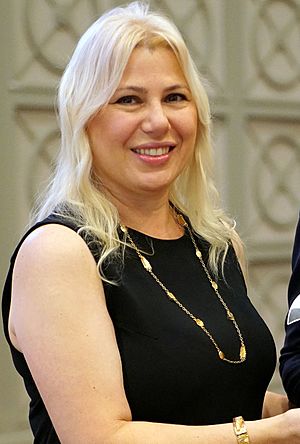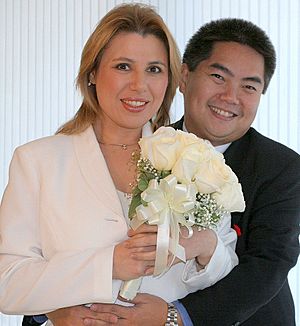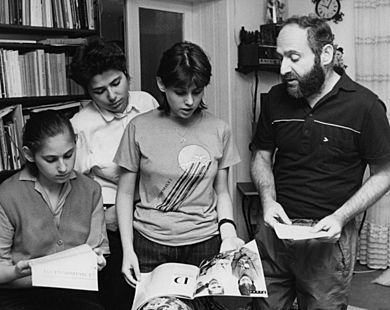Susan Polgar facts for kids
Quick facts for kids
Susan Polgar
|
|
|---|---|

Polgar in 2018
|
|
| Born | April 19, 1969 Budapest, Hungary
|
| Spouse(s) |
Jacob Shutzman
(m. 1994, divorced)Paul Truong
(m. 2006) |
| Children | 2 |
| Chess career | |
| Country | Hungary United States (2002–2019) |
| Title | Grandmaster (1991) |
| Women's World Champion | 1996–1999 |
| FIDE rating | 2577 (March 2026) [inactive] |
| Peak rating | 2577 (January 2005) |
Susan Polgar is a famous Hungarian-American chess grandmaster. She was the Women's World Chess Champion from 1996 to 1999. At just 15 years old, in 1984, she became the top-ranked female chess player in the world. In 1991, she earned the title of Grandmaster, becoming only the third woman to do so.
Besides playing, Susan Polgar is also a coach, writer, and promoter of chess. She supports many chess tournaments for young players. She leads the Susan Polgar Institute for Chess Excellence (SPICE) at Webster University.
Contents
About Susan Polgar's Life
Susan Polgar was born on April 19, 1969, in Budapest, Hungary. In 1994, she married Jacob Shutzman and moved to New York. They had two sons, Tom (born 1999) and Leeam (born 2000), before they divorced. In 2006, she married Paul Truong. She now lives near St. Louis, Missouri.
Susan Polgar's Amazing Chess Journey
Susan Polgar and her two younger sisters, Judit and Sofia, were part of a special learning project. Their father, László Polgár, wanted to show that children could become amazing at something if they started training very early. He believed that "geniuses are made, not born." He and his wife, Klara, taught their three daughters at home, with chess as their main subject.
Early Chess Successes
Susan Polgar started playing chess very young. At age 4, she won her first chess tournament, the Budapest Girls' Under-11 Championship, winning all 10 of her games. In 1981, when she was 12, she won the World Under 16 Girls Championship.
By July 1984, at age 15, Polgar was the top-rated female chess player in the world. In 1991, she became the third woman ever to be given the title of Grandmaster by FIDE (the World Chess Federation). She was the youngest woman to become a grandmaster at that time.
In 1992, Polgar won both the Women's World Blitz Championship (fast chess) and the Women's World Rapid Championship (quick chess).
Becoming Women's World Champion
Susan Polgar became the Women's World Champion in 1996. Her next championship match was planned for 1998, but there were problems finding a sponsor. In 1999, a match was set up in China, but Polgar had just given birth to her son, Tom, and felt she didn't have enough time to get ready. She also wanted a larger prize fund.
Because she couldn't play under those conditions, FIDE said she had given up her title. Polgar later settled the issue with FIDE. She has not played in Women's World Championship events since then.
Playing for the United States
In 2002, Susan Polgar started playing for the United States instead of Hungary. In 2003, the United States Chess Federation named her "Grandmaster of the Year." She was the first woman to receive this honor. That same year, she also became the first woman to win the US Open Blitz Championship. She won this title again in 2005 and 2006.
At the 2004 Chess Olympiad in Spain, she played for the United States women's team. The team won the silver medal, and Polgar won an individual gold medal for her excellent performance. She has won a total of eleven medals at the Women's Chess Olympiad, never losing a game.
In July 2005, Polgar set four world records by playing many games at once in a simultaneous exhibition in Florida. She played 326 games at the same time, winning 309 of them!
Susan Polgar as a Chess Coach
In 1997, Polgar started the Polgar Chess Center in New York to teach chess to children. In 2002, she created the Susan Polgar Foundation. This foundation has supported many chess tournaments for young players, including national and world championships for boys and girls.
Coaching College Chess Teams
In 2007, Susan Polgar became the head coach for the Texas Tech Knight Raiders chess team. In 2011, her team won the President's Cup, making Polgar the first female head coach to lead a college chess team to a national title. They won again in 2012.
In 2012, Polgar and her SPICE program moved to Webster University in St. Louis, Missouri. The Webster University chess team has won the Final Fours of College Chess (President's Cup) multiple times, from 2013 to 2017. Polgar was recognized as the College Coach of the Year in 2012-13.
In 2014, Polgar received the Furman Symeon medal, given to the best chess coach. She was the first American coach and the first woman to receive this top coaching award from FIDE.
In March 2019, Susan Polgar was added to the U.S. Chess Hall of Fame in St. Louis, Missouri.
Images for kids
See also
 In Spanish: Zsuzsa Polgár para niños
In Spanish: Zsuzsa Polgár para niños





